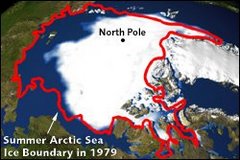Site Review: Ecological Footprint Quiz
The Ecological Footprint Quiz (©Redefining Progress) seeks to give you its best answer to the question of how much "nature" your lifestyle requires?
The concept behind an ecological footprint has been around for at least a millennium and a half; back in 5th century Anglo-Saxon England environmental footprints were known as 'hides' and 'hundreds'. A hide describes the amount of arable land it takes to feed a single family for a year, and a hundred describes how much land it would take to feed a hundred families.The Ecological Footprint Quiz estimates how much productive land and water you need to support what you use and what you discard. After answering 15 easy questions you'll be able to compare your Ecological Footprint to what other people use and to what is available on this planet.
I digress. I answered the quiz questions. They break down your Ecological Footprint into Food, Goods, Shelter and Mobility footprints. Press the button and Bob's your uncle:
CATEGORY --------------------- GLOBAL HECTARES8.8 hectares distributed globally in little furlongs, plots and parcels - so I'm not doing too badly, right?
FOOD ........................................................ 3.1
MOBILITY ................................................. 1.9
SHELTER ................................................... 0.9
GOODS/SERVICES ....................................... 2.9
TOTAL FOOTPRINT ..................................... 8.8
IN COMPARISON, THE AVERAGE ECOLOGICAL FOOTPRINT IN YOUR COUNTRY (Australia) IS 7.6 GLOBAL HECTARES PER PERSON.Alright already! I hear you. It's not enough that they admonish me, they graphically drive home the point by whipping up 5.9 planets side by side. So? At least I have room to improve. Multiple global room it seems.
WORLDWIDE, THERE EXIST 1.8 BIOLOGICALLY PRODUCTIVE GLOBAL HECTARES PER PERSON.
IF EVERYONE LIVED LIKE YOU, WE WOULD NEED 4.9 PLANETS.
My Food Footprint has the biggest global hectarage (3.1) of all my categories. That's because I eat a lot of meat and dairy. Love it. I am a southern hemisphere born and bred carnivore who emigrated from one barbecue culture to another. I didn't spend evolution clawing my way up the food chain just to eat carrots and pumpkin forever. Nevertheless there are a few sound reasons to cut back on meat and dairy, including the looking after your heart and bowel. I wonder, how many global hectares could I cut back on if:
I cut back on rate of meat and dairy consumption to something more healthy, from Almost always to Often
A. How often do you eat animal based products? (beef, pork, chicken, fish, eggs, dairy products)and conscienciously cut back on processed and packaged food, especially that from far away and thus reducing the impact of transportation?
- Never (vegan)
- Infrequently (no meat, and eggs/dairy a few times a week) (strict
vegetarian)- Occasionally (no meat or occasional meat, but eggs/dairy almost daily)
- Often (meat once or twice a week)
- Very often (meat daily)
- Almost always (meat and eggs/dairy in almost every meal)
B. How much of the food that you eat is processed, packaged and imported?Well my Food Footprint reduced a whole global hectare, from 3.1 to 0 2.1. And this seemed to have a positive effect on my Mobility Footprint, down from 1.9 to 1.8 (please explain?), and my Goods/Services Footprint, down from 2.9 to 2.8. I guess here I generate less landfill. Best of all I bring my Total Footprint in line with the national average of 7.6, a full 1.2 global hectares improvement. I am instantly rewarded from my aspiring good global citizenship by knowing that:
- Most of the food I eat is processed, packaged, and from far away
- Three quarters
- Half
- One quarter
- Very little.
- Most of the food I eat is unprocessed, unpackaged and locally grown.
IF EVERYONE LIVED LIKE YOU, WE WOULD NEED 4.2 PLANETS TO LIVE ONI rate Ecological Footprint Quiz 4.9 planets out of a possible 5 (I'm taking .1 off for being rude) assuming it employs an accurate methodology in its calculations. It does get one thinking, and potentially acting. You could find yourself involved in an email campaign to your local council to get them to consider commissioning an Ecological Footprint index for the community from the good people at Redefining Progress.


No comments:
Post a Comment